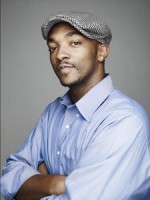Column Name
Title
Anthony Mackie opened in Martin McDonagh’s new Broadway play, A Behanding in Spokane, on March 4, and three days later he was standing onstage at the Academy Awards with his director and co-stars of the movie The Hurt Locker, which received this year’s best picture award. Success on film as well as on stage is something Mackie (Group 30) has gotten used to since graduating from Juilliard. He has appeared in dozens of feature films, includingNotorious, Million Dollar Baby, The Manchurian Candidate, and 8 Mile, and last summer he traveled back to New York to play a lead in the Shakespeare in the Park production of The Bacchae. In a recent interview with fourth-year acting student Amelia Pedlow, Mackie, 30, spoke about theater, film, and his hometown of New Orleans.
Body
Anthony Mackie opened in Martin McDonagh’s new Broadway play, A Behanding in Spokane, on March 4, and three days later he was standing onstage at the Academy Awards with his director and co-stars of the movie The Hurt Locker, which received this year’s best picture award. Success on film as well as on stage is something Mackie (Group 30) has gotten used to since graduating from Juilliard. He has appeared in dozens of feature films, includingNotorious, Million Dollar Baby, The Manchurian Candidate, and 8 Mile, and last summer he traveled back to New York to play a lead in the Shakespeare in the Park production of The Bacchae. In a recent interview with fourth-year acting student Amelia Pedlow, Mackie, 30, spoke about theater, film, and his hometown of New Orleans.
You’ve proven yourself to be a master of both stage and screen. Are there adjustments that you make to your acting when jumping back and forth between those mediums?
The thing about film acting is, you know, you have to realize who you’re playing for—you are playing for the camera and the camera can capture your eyes or your entire body. Something I learned on my first movie is to ask the director if they want a close up or if they want a wide shot because a wide shot is just like doing a play. When you’re in a theater, you perform for the person in the furthest seat away from you in the house. On film, you’re performing for a camera which is literally inches away.
Congratulations on The Hurt Locker. Did you know when you auditioned for the role or when you read the script that this was a special film?
When I read the script and found out Kathryn [Bigelow] was directing it, I knew it would go along with other films I had done—it would be a good movie. I didn’t know that it was going to be a best picture nominee and winner at the Academy Awards. No one knew that it was going to turn into the freakish phenomenon that it has.
Speaking of that, what was the dynamic like working with a female director in the male-centric universe that the movie depicts?
You know, the great thing about it is I’ve been fortunate to work with a lot of female directors. My first job ever, coming out of Juilliard, was with a female director who graduated from Juilliard [Rosemary K. Andress]. So that one thing I’ve realized from all the great female directors I’ve worked with is they never apologize or made excuses for being a woman. Female directors work you as hard as any other director you’ll work with. Their ability is never based on or questioned because of their [gender].
What does your family and community back in New Orleans think of all this great work you’ve been up to?
My family is always beside themselves. They never expected me to be standing onstage at the Oscars, accepting an award for best picture. It was great. I mean, it was great! To hear from my family and to know that they were watching, but New Orleans has always got my back, from my first job to The Hurt Locker. They’ve always supported me. No, I’m definitely not detached from my family and New Orleans now that I’m starting to do film and television.
Extracurricular activities that you enjoy when you have down time?
My dad ran a construction company in New Orleans for over 40 years. So growing up, you know, every summer, I did construction. My work-study job at Juilliard was down in the bowels of the building working in the building management office. That was something that was always there, a saving grace of mine. Last year, I took time off, went down to New Orleans, and built a house.
Is there any particular role or any author you’d like to work on in the future?
Since I went to Juilliard, I like the idea of doing some Shakespeare. The idea of being a young actor and doing Shakespeare onstage is kind of a daunting task for everyone involved. Even though you went to Juilliard, it’s an enigma, the idea [that] you wanted to do Shakespeare. Even when you get the opportunity to do Shakespeare, it’s kind of an enigma to everyone, casting and directing Shakespeare. So I’d like to show everybody that not only can I do something like The Hurt Locker or Notorious, I can also do Shakespeare.





